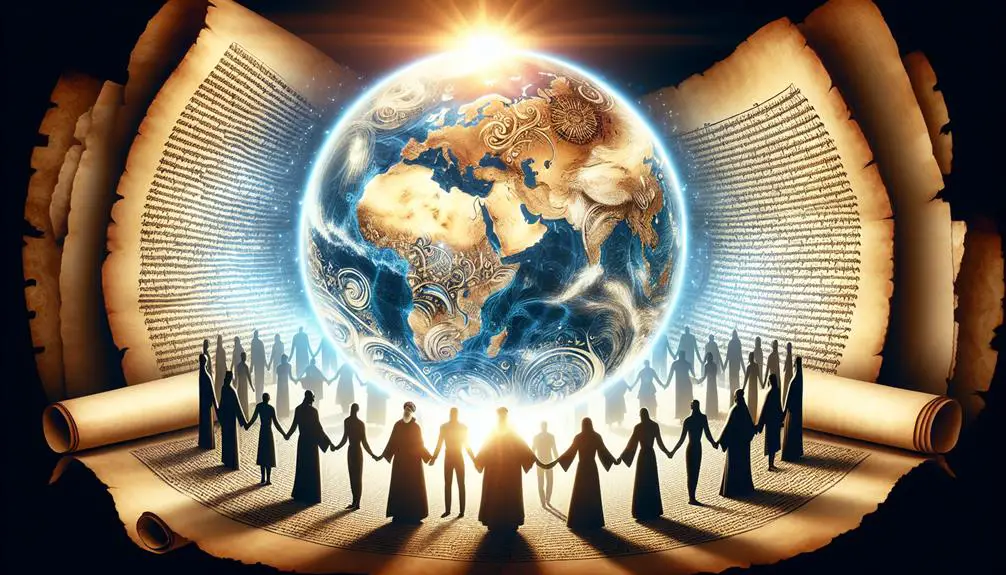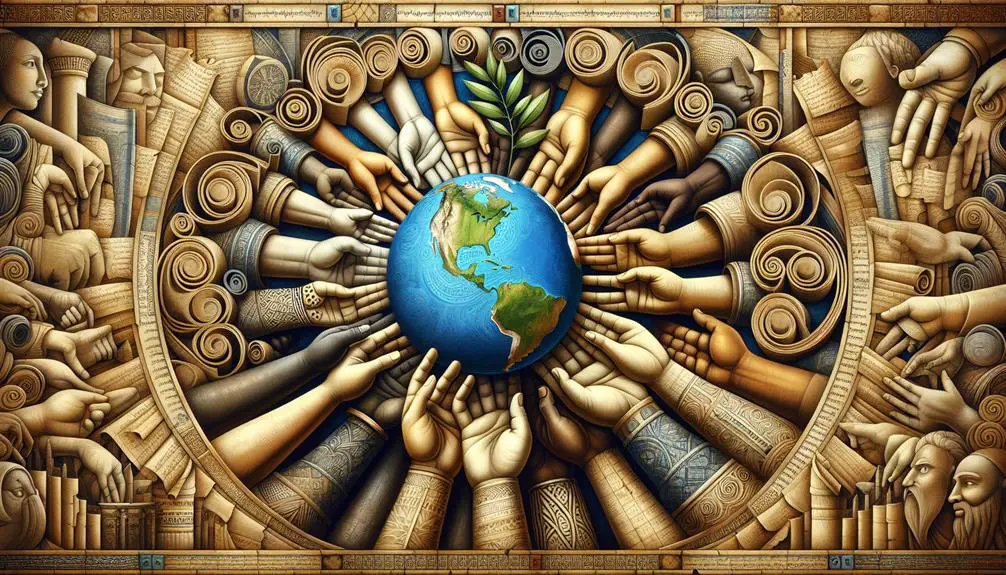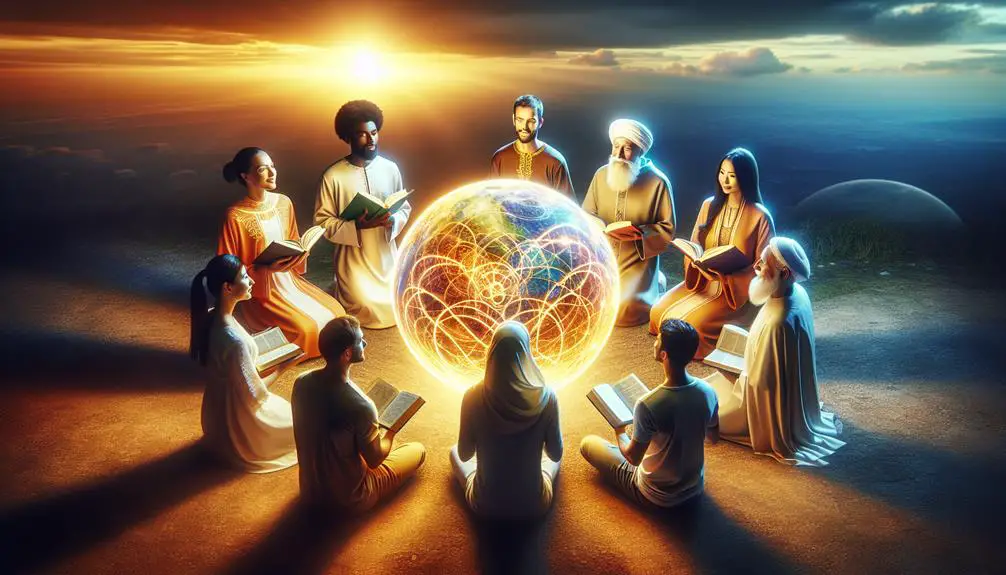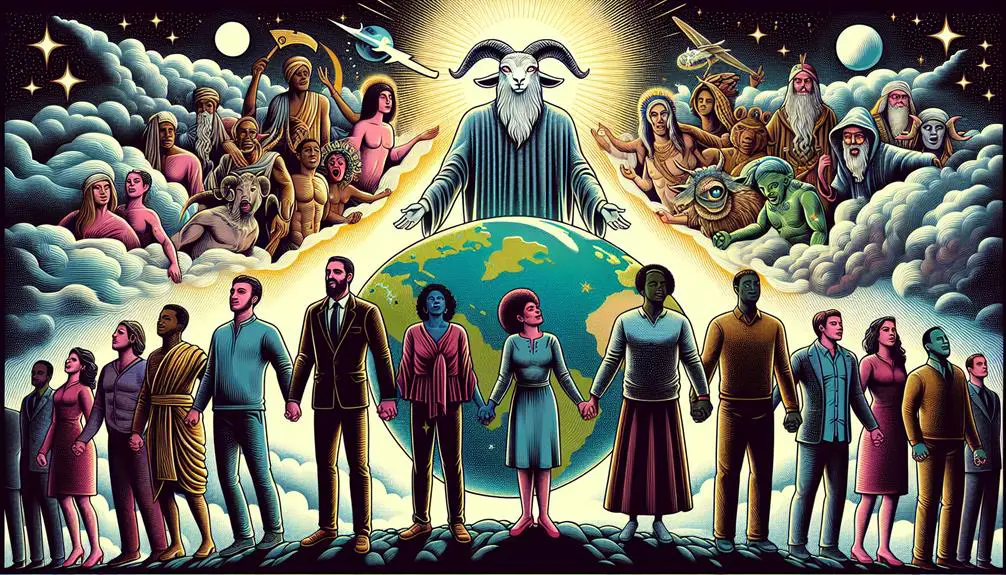Witness the biblical prophecy of a One World Order, delving into ancient texts that illuminate our path towards global unity and future challenges.

One World Order in the Bible
As the saying goes, 'Unity is strength,' and you'll find this theme woven throughout the Bible, hinting at a One World Order. From the prophetic visions in Daniel to the apocalyptic revelations in John's writings, the scripture offers a rich tapestry of unity and global governance that's both intriguing and complex.
But what does this mean for modern society? As you explore the biblical foundations and prophecies, you'll uncover how ancient texts might shed light on today's quest for global unity. The answers may surprise you, urging you to question how close we are to realizing this millennia-old vision.
Key Takeaways
- The Bible foresees a form of global governance as a sign of end times, culminating in divine sovereignty.
- Unity efforts like the Tower of Babel are cautioned against, highlighting divine intervention in human ambition.
- Revelation contrasts human-led unity with a divinely orchestrated New World Order under Christ's reign.
- Historical and cultural contexts deeply influence interpretations of biblical prophecies regarding a One World Order.
Biblical Foundations of Unity

The concept of unity in the Bible is foundational, serving as a bedrock for understanding the interconnectedness of humanity through divine intention. This principle isn't merely a call for superficial harmony but a profound invitation to Christian fellowship and spiritual unity that transcends cultural, racial, and social divisions. In examining the scriptures, you'll find that the Bible promotes a vision of oneness that's both radical and transformative, urging believers to embody the unity that exists within the Godhead itself.
This spiritual unity isn't an abstract concept but a tangible reality that manifests in the communal life of the church. The New Testament, in particular, emphasizes the importance of believers coming together in worship, prayer, and service, reflecting the unity that Jesus prayed for his followers. 'That they all may be one, as You, Father, are in Me, and I in You; that they also may be one in Us, that the world may believe that You sent Me' (John 17:21). This verse underscores the intrinsic link between Christian fellowship and the witness of the church to the world.
Moreover, the epistles further elaborate on this theme, advocating for a unity that acknowledges and celebrates diversity within the body of Christ. Here, spiritual unity doesn't erase individual differences but rather brings them together in a harmonious and purposeful whole. This biblical foundation of unity, then, isn't just a theological ideal but a practical guide for building communities that reflect God's inclusive and reconciling love.
Prophecies of Global Governance

Building on the biblical foundation of unity, scripture also hints at a future where global governance emerges as a fulfillment of divine prophecy. You'll find that Daniel's visions, particularly, offer a detailed framework for understanding this concept. These prophetic insights don't just sketch a vague notion of unity but delineate a structured form of global governance, marked by significant events and figures, including the Antichrist's reign.
Delving deeper, Daniel's visions portray a series of empires that symbolize the progression towards this ultimate governance structure. His dream of the statue composed of various materials represents successive kingdoms, culminating in a final empire that's partly strong and partly brittle. This imagery suggests a complex, interconnected global system, susceptible yet resilient, that paves the way for the Antichrist's rule. It's in this context that global governance isn't merely a political or social construct but a prophetic signpost, indicating the nearing culmination of history as foretold in biblical prophecy.
Furthermore, the Antichrist's reign, as depicted in scripture, embodies the zenith of human governance without divine intervention. It's a period where global governance reaches its peak in terms of human authority, yet it's also a time marked by profound spiritual apostasy. This paradox highlights the tension between human aspiration for unity and governance and the divine plan for humanity.
In analyzing these prophetic texts, you're invited to see beyond their historical and literary dimensions. They serve as a mirror reflecting humanity's enduring quest for governance and unity, intertwined with divine sovereignty and prophetic destiny.
The Tower of Babel Revisited

Reflecting on the Tower of Babel narrative, you'll uncover a profound allegory for humanity's relentless pursuit of unity and sovereignty, defying divine mandate. This story, deeply etched in the collective consciousness, serves as a pivotal lesson on the limits of human ambition and divine supremacy. At its core, the Tower of Babel incident isn't just about architectural ambition but also underscores the emergence of linguistic diversity as a divine intervention to curb human arrogance and promote a multiplicity of cultures.
The narrative highlights several key elements:
- The unified language as a tool for unprecedented collaboration.
- Architectural ambition driving humanity to attempt to reach the heavens.
- God's intervention to disperse humanity and confuse their languages.
- The introduction of linguistic diversity as a means to halt a unified human project.
- The enduring symbol of the Tower as a testament to the risks of overreaching ambition.
Analyzing this narrative, it's evident that the Tower of Babel is more than a story about building a structure; it's a cautionary tale about the balance between human aspiration and the natural order of the world. The divine response to scatter and diversify languages serves as a critical juncture in human history, emphasizing the value and necessity of diversity for the human race's progression.
This reevaluation of the Tower of Babel story invites a reflection on contemporary global efforts towards unity. It questions whether the pursuit of a singular global identity, in the face of inherent cultural and linguistic diversity, overlooks the intrinsic lesson embedded within this ancient narrative.
Revelation's New World Order

Shifting our focus to the Book of Revelation, we encounter a contrasting vision of unity in the prophesied New World Order. Unlike previous biblical narratives that might suggest a divine disapproval of human unity efforts, Revelation presents a framework that's deeply intertwined with apocalyptic symbols and divine intentions for humanity's ultimate destiny. This vision, replete with symbolic imagery, offers a unique lens through Mark's perspective on the fate of the world.
In analyzing the New World Order as depicted in Revelation, it's crucial to decode the apocalyptic symbols that form the backbone of its narrative. These symbols, ranging from the Beast to the Lamb, aren't merely characters or events but are imbued with profound theological significance. They serve as markers of divine judgment, redemption, and the eventual establishment of a divine kingdom on Earth.
Mark's perspective in Revelation isn't just about foretelling doom but also about envisioning a new era of divine governance and unity among nations under the leadership of Christ. This vision contrasts sharply with human attempts at unity, such as the Tower of Babel, by positioning the New World Order as a divine initiative rather than a human endeavor.
The intricate use of apocalyptic symbols in Revelation serves a dual purpose. It not only conveys the inevitability of divine intervention but also emphasizes the transformative nature of this intervention. The symbols are a means to articulate a future where divine and human realms converge, ushering in an era of unparalleled peace and unity under God's sovereignty.
Interpretations Through History

Throughout history, interpretations of the New World Order in Revelation have varied widely, reflecting the changing contexts and theological perspectives of different eras. These interpretations often mirror the apocalyptic fears and cultural influences of their time, shaping and reshaping the understanding of what a New World Order signifies in a religious context.
You'll find that the historical lens through which Revelation's New World Order is viewed can significantly impact its interpretation. Several factors have consistently played a role in these interpretations:
- The political climate of the time: Political upheavals and shifts in power often lead to a resurgence in apocalyptic thinking, with Revelation being interpreted in light of current events.
- Technological advancements: Each era's technological progress, or lack thereof, influences how the symbols in Revelation are understood.
- Cultural influences: Art, literature, and prevailing cultural norms can deeply affect the interpretation of biblical texts, including those referring to a New World Order.
- Theological developments: Shifts in theological thought, including differing views on eschatology, have led to varied understandings of the text.
- Historical events: Major events, such as wars, pandemics, and natural disasters, often trigger renewed interest in apocalyptic prophecies, influencing their interpretation.
These factors underscore the complexity of interpreting the concept of a New World Order within the biblical context of Revelation. They reveal how apocalyptic fears and cultural influences intertwine, making the interpretation of such a concept a reflection of humanity's deepest anxieties and hopes across ages.
Frequently Asked Questions
How Do Contemporary Geopolitical Events Align With the Concept of a One World Order as Described in the Bible?
You're looking at how modern geopolitical events might signal a shift towards a unified global order.
Technological advancements have shrunk distances, making communication and coordination across continents instantaneous. This has led to a certain level of cultural homogenization, where values and lifestyles start resembling each other more closely.
These phenomena could be interpreted as steps toward a more interconnected and unified world, aligning with the concept of a one world order.
What Are the Ethical Implications of Striving for a One World Order in Light of Biblical Teachings on Individuality and National Sovereignty?
You're facing a complex issue: the ethical implications of striving for unity while honoring individual rights and cultural diversity.
It's crucial to balance the pursuit of global cooperation with the respect for individuality and national sovereignty.
This balance is key to maintaining a world where cultural diversity thrives alongside collective goals.
Ethically, it's about finding a middle ground where global unity doesn't overshadow the values of individual rights and cultural identities.
How Have Different Denominations Within Christianity Interpreted the Concept of a One World Order Differently, and What Are the Roots of These Divergences?
You'll find that denominations within Christianity interpret the concept of a one-world order quite differently due to varied eschatological interpretations and denominational histories. These divergences stem from how each tradition understands biblical prophecy and end times, influencing their stance on global unity.
Exploring these perspectives reveals a spectrum of beliefs, from those seeing a one-world government as fulfillment of prophecy to others viewing it as a threat to individual and national sovereignty.
In What Ways Have Non-Christian Faiths and Philosophies Responded to or Interpreted the Biblical Concept of a One World Order?
You'll find that non-Christian faiths and philosophies engage with the idea of global unity through interfaith dialogues and philosophical critiques.
These conversations often reveal diverse interpretations and responses, grounded in their own traditions and worldviews. They analyze and sometimes challenge the concept, contributing to a broader understanding of global harmony.
This approach allows for a rich tapestry of perspectives, enhancing the discourse around a unified world order.
How Does the Concept of a One World Order in the Bible Align With or Contradict Modern Theories and Movements Related to Globalization and Global Unity?
You're diving into a complex debate: how modern globalization theories and unity movements relate to or challenge the idea of a one world order.
With technological integration and cultural homogenization at the forefront, you're navigating waters where ancient predictions and current realities collide.
Analyzing this, you'll find that these contemporary phenomena either mirror or starkly contrast with ancient concepts, offering a rich ground for scholarly exploration into how global dynamics align with or oppose historical visions.
Conclusion
In conclusion, the Bible's narrative threads weave a complex tapestry of unity and division, hinting at a form of global governance. From the Tower of Babel to Revelation, these stories underscore humanity's perennial quest for a New World Order.
Yet, as history shows, 'man proposes, but God disposes.' Analyzing these texts reveals a nuanced perspective on the divine interplay between human aspiration and celestial will, urging a scholarly reflection on our pursuit of worldwide unity under the scrutiny of biblical prophecy.



Sign up